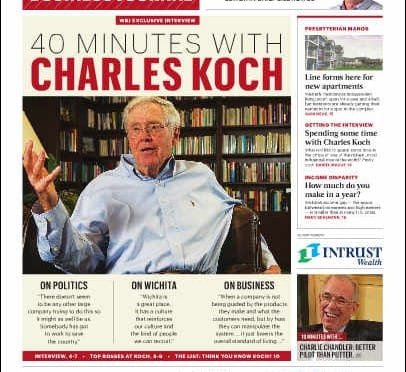Tag: Cronyism
-

Wichita Business Journal remodels, features Charles Koch interview
The Wichita Business Journal has relaunched and starts its new life with features on Koch Industries and an extended interview with Charles Koch.
-
In Wichita, citizens want more transparency in city government
In a videographed meeting that is part of a comprehensive planning process, Wichitans openly question the process, repeatedly asking for an end to cronyism and secrecy at city hall.
-

Wichita planning documents hold sobering numbers
Planning documents released this week hold information that ought to make Wichitans think, and think hard. The amounts of money involved are large, and portions represent deferred maintenance. That is, the city has not been taking care of the assets that taxpayers have paid for.
-

Viewing the seen and unseen
The art of economics consists in looking not merely at the immediate but at the longer effects of any act or policy; it consists in tracing the consequences of that policy not merely for one group but for all groups.
-

What type of watchdog are you?
To help citizens become government watchdogs, the Franklin Center for Government and Public Integrity is providing a new resource. It’s the Watchdog Quiz, and it will help you discover what type of role you will want to fill as a government watchdog.
-
Wichita considers policy to rein in council’s bad behavior
The Wichita City Council will consider a policy designed to squelch the council’s ability to issue no-bid contracts for city projects, a policy made necessary by past bad behavior.
-
In Wichita, why do some pay taxes, and others don’t?
A request by a luxury development in downtown Wichita raises issues, for example, why do we have to pay taxes?
-
WichitaLiberty.TV February 2, 2014
In this episode of WichitaLiberty.TV: A Kansas college professor claims that college costs are rising only a tad faster than inflation. We’ll take a look at the actual numbers. Then, this week Wichita Mayor Carl Brewer delivered the annual State of the City address. A few things deserve comment.
-
The state of Wichita, 2014
Wichita Mayor Carl Brewer delivered the annual State of the City address. He said a few things that deserve discussion.
-
Voice for Liberty Radio: Private enterprise and markets
Mary Beth Jarvis delivered the keynote address of the Kansas Republican Party Convention for 2014. She spoke on the topics of private enterprise and the profit and loss system.
-
Wichita campaign finance reform, and local elections in Kansas
In this excerpt from WichitaLiberty.TV: An illustration of the need for campaign finance reform in Wichita and Kansas. A related issue is the need to change the timing of local elections in Kansas.
-
WichitaLiberty.TV January 5, 2014
In this episode of WichitaLiberty.TV: A look back at a few problematic issues regarding ethical government in Wichita in 2013. Topics include: Campaign contributions, the timing of city and school board elections, Mayor Carl Brewer’s integrity and threats, the need for campaign finance reform, the firing of a television news reporter, the apparently non-transparent way…